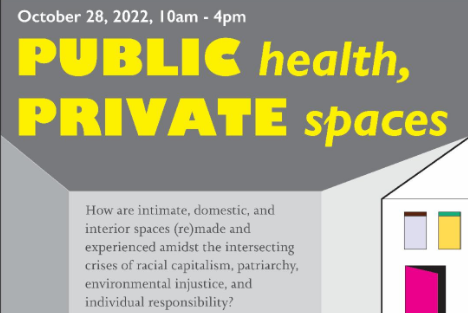
The CMU Center for the Arts in Society presents Public Health, Private Spaces: A conversation about the intimate landscapes of health
October 28th, 10am
On Zoom
*This is not presented by Osher at CMU.*
As the COVID-19 pandemic brought much of the world to a close in 2020, disease control and mitigation measures began to reshape public spaces. Plexiglass barriers, outdoor dining, building ventilation, non-porous materials, pop-up vaccination or testing sites, and parks and outdoor spaces all provided different means to contain viral transmission. At the same time, with homes doubling as workspaces, learning environments, child-, elder-, and health-care spaces and more, the pandemic also brought renewed attention to intimate spaces as sites “essential” for the continued functioning of capitalist economies. Lockdowns, quarantines, and school-closures reconfigured the already blurred borderlines between personal-professional, home-work, purity-danger, public-private, and human-nature in the context of intimate spaces, just as they widened the distance between those on the front lines and those who retreated to second homes.
Since then, with private comportment superseding imperatives for public or collective health — “your health is in your hands” — the individual, the home, and the household continue to be implied as the loci of health, even as evictions, increasing rents and the wider “racial regimes of property” circumscribe who gets to shelter in place. Meanwhile, the allocation of responsibility onto the individual, and the demarcation of the public and the private as zones of contagion and safety respectively, reinforces the long-standing (common)sense of a “world (that) can be divided into a controllable space (the private-affective) and an uncontrollable one (the public-instrumental).” Yet, notions of safety and health centered on the home cannot be easily disentangled from the material relationships, social practices, desires, and discourses that prop the “home” and the “household” atop inequities of gender, race, class, and nation. At the same time we may also usefully inquire, following bell hooks, about the construction of “home-places”, where safety, care, and resistance are carefully nurtured, amidst and against the “fundamental uncaringness” of structures of racial capitalism.
We will dialogue on the ways in which intimate spaces and indoor environments have become crucial sites of the intersecting crises of racial capitalism, pandemic, patriarchy, neoliberal privatization, and environmental injustice. We will think about how the individualization of responsibility amidst a weakening social contract has shifted the different forms, scales, and embodiments of intimacy; how indoor environments might be seen as political-ecological spaces and as sites for the production of environmental injustices; but also how the reconfigurations of intimate spaces may shape new “attunements” to collective worlds.
For more information to go: https://www.cmu.edu/cas/events/2022-23/fall/phps-symposium.html
